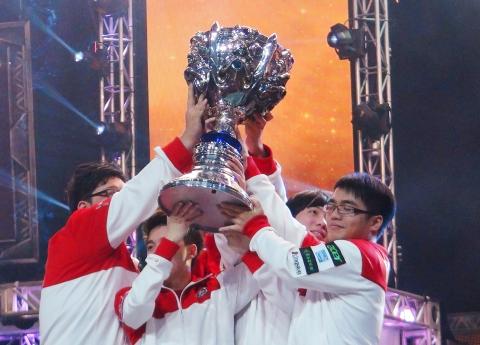A Taiwanese video gaming team defeated its South Korean rival 3-1 in the finals of an international online video game competition in Los Angeles, California, on Saturday, bagging the top honor and US$1 million in prize money.
The Taipei Assassins (TPA) dueled against South Korea’s Azubu Frost in the Grand Final of the League of Legends Season 2 World Championship, forcing the South Korean team into an untenable position early in the third round before clinching the match in the fourth.
The seven-strong team were led by Chen Hui-chung (陳彙中), 22, who quit school to game professionally.

Photo: CNA
The other four of the five members the team fielded in the playoffs were Wang Jung-tsan (王榮燦), Chang Po-wei (張博為), Sung Kuan-po (宋寬柏) and Liu Wei-chien (劉偉健), who is from Hong Kong.
The two reserve players were Lin Ying-po (林穎波), the only female member of the team, and Chiu Po-chieh (邱柏傑). All the members are between 19 and 23 years old.
Despite general pessimism over TPA’s performance at the outset, the team’s successive defeats of South Korea’s third-seeded NaJin Sword, second-seed Moscow 5 of Russia and first-seed Azubu Frost, helped them clinch a decisive victory.
The Taipei team advanced into the Grand Final on Wednesday after defeating the Moscow 5, the Season 1 champions, in two straight games.
Saturday’s competition was watched live by nearly 20,000 people at the center, with a number of Taiwanese making the journey to Los Angeles to cheer on the team.
Interestingly, the cheering from the audience was almost all for the TPA, due to an incident on the part of Azubu Frost. Regulations prohibit players competing on stage from looking backward at a giant screen that shows an entire map without the fog-of-war settings. Azubu Frost broke that rule during a pause when a problem with the team’s microphone was being fixed.
The team was docked 20 percent (US$30,000) of their total prize money for the indiscretion, which Riot Games said would go toward the company’s charity program in South Korea.
The competition had 12 teams from around the world competing for total prize money of US$2 million.
The game, developed and published by Riot Games for Microsoft Windows, is based on the popular “Defense of the Ancients” map for Warcraft 3, a video game developed by Blizzard Entertainment. League of Legends has more than 2.4 million registered users in Taiwan and more than 70 million users worldwide.
Commenting on the playoffs after the competition, Liu said he was happy the TPA team had been able to secure the championship against great odds.
Chen also expressed gratitude to the company Garena for providing training, as well as company sponsors, adding that it was because of their support that the TPA team had been able to get where they are today.

MORE VISITORS: The Tourism Administration said that it is seeing positive prospects in its efforts to expand the tourism market in North America and Europe Taiwan has been ranked as the cheapest place in the world to travel to this year, based on a list recommended by NerdWallet. The San Francisco-based personal finance company said that Taiwan topped the list of 16 nations it chose for budget travelers because US tourists do not need visas and travelers can easily have a good meal for less than US$10. A bus ride in Taipei costs just under US$0.50, while subway rides start at US$0.60, the firm said, adding that public transportation in Taiwan is easy to navigate. The firm also called Taiwan a “food lover’s paradise,” citing inexpensive breakfast stalls

TRADE: A mandatory declaration of origin for manufactured goods bound for the US is to take effect on May 7 to block China from exploiting Taiwan’s trade channels All products manufactured in Taiwan and exported to the US must include a signed declaration of origin starting on May 7, the Bureau of Foreign Trade announced yesterday. US President Donald Trump on April 2 imposed a 32 percent tariff on imports from Taiwan, but one week later announced a 90-day pause on its implementation. However, a universal 10 percent tariff was immediately applied to most imports from around the world. On April 12, the Trump administration further exempted computers, smartphones and semiconductors from the new tariffs. In response, President William Lai’s (賴清德) administration has introduced a series of countermeasures to support affected

CROSS-STRAIT: The vast majority of Taiwanese support maintaining the ‘status quo,’ while concern is rising about Beijing’s influence operations More than eight out of 10 Taiwanese reject Beijing’s “one country, two systems” framework for cross-strait relations, according to a survey released by the Mainland Affairs Council (MAC) on Thursday. The MAC’s latest quarterly survey found that 84.4 percent of respondents opposed Beijing’s “one country, two systems” formula for handling cross-strait relations — a figure consistent with past polling. Over the past three years, opposition to the framework has remained high, ranging from a low of 83.6 percent in April 2023 to a peak of 89.6 percent in April last year. In the most recent poll, 82.5 percent also rejected China’s

PLUGGING HOLES: The amendments would bring the legislation in line with systems found in other countries such as Japan and the US, Legislator Chen Kuan-ting said Democratic Progressive Party (DPP) Legislator Chen Kuan-ting (陳冠廷) has proposed amending national security legislation amid a spate of espionage cases. Potential gaps in security vetting procedures for personnel with access to sensitive information prompted him to propose the amendments, which would introduce changes to Article 14 of the Classified National Security Information Protection Act (國家機密保護法), Chen said yesterday. The proposal, which aims to enhance interagency vetting procedures and reduce the risk of classified information leaks, would establish a comprehensive security clearance system in Taiwan, he said. The amendment would require character and loyalty checks for civil servants and intelligence personnel prior to